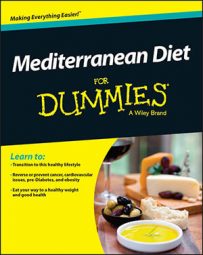Mostly all of the fat calories from the Mediterranean diet come from olive oil, fish oil, and nuts. Dietary Guidelines for Americans suggest that, on average, about 30 percent of your calories should come from fat. With the Mediterranean diet, you get up to 40 percent of your calories from fat. It may seem like a paradox that a diet richer in fat is healthier for you.
But it’s time to dispel the old nutrition myth that fat is bad! Of course, where the fat comes from is a key factor.
Actually, in the 1960s, about 45 percent of Americans’ calories came from fats and oils — a time when the obesity rate was below 15 percent. Today, when closer to 30 percent of calories come from fat, about one-third of American adults are obese. What gives?
When people reduced fat intake, they did so across the board, cutting out sources of heart-healthy fats as well as unhealthy fats. This change occurred around the same time that people turned to consuming more refined carbohydrates, like white breads and other whole grains stripped of their nutrients, and sugary drinks, which are naturally low in fat.
In addition, low-fat food products added refined carbohydrates back in for flavor. Compounding the problem was the fact that low-fat products are neither psychologically nor physically satisfying, making us prone to consuming larger portions to feel satisfied.
The shift away from all-natural foods that contain real ingredients instead of processed food is exactly what the Mediterranean diet is not. Nor does the Mediterranean diet isolate one food group as “good” or “bad,” a tendency of traditional Western diets that hasn’t helped our health or weight in the long haul.
The results of a large-scale study published in the New England Journal of Medicine in 2013 were so dramatic and foretelling that the researchers ended the study early to spread the word. This study followed about 7,500 people in Spain over the course of about five years. At the beginning of the study, the participants did not have heart disease. They were divided into three categories:
Category 1: Mediterranean diet plus at least 4 tablespoons extra virgin olive oil every day
Category 2: Mediterranean diet plus at least 30 grams of nuts every day
Category 3: Low-fat diet
Those participants in the first two categories had a 25 to 30 percent lower risk of suffering heart attack and stroke. Few studies before this have established a direct link between diet and life-threatening occurrences. Typically, studies measure markers like cholesterol levels and weight, but experts close to the study suggest that diet can be a primary prevention against cardiac events like stroke.

